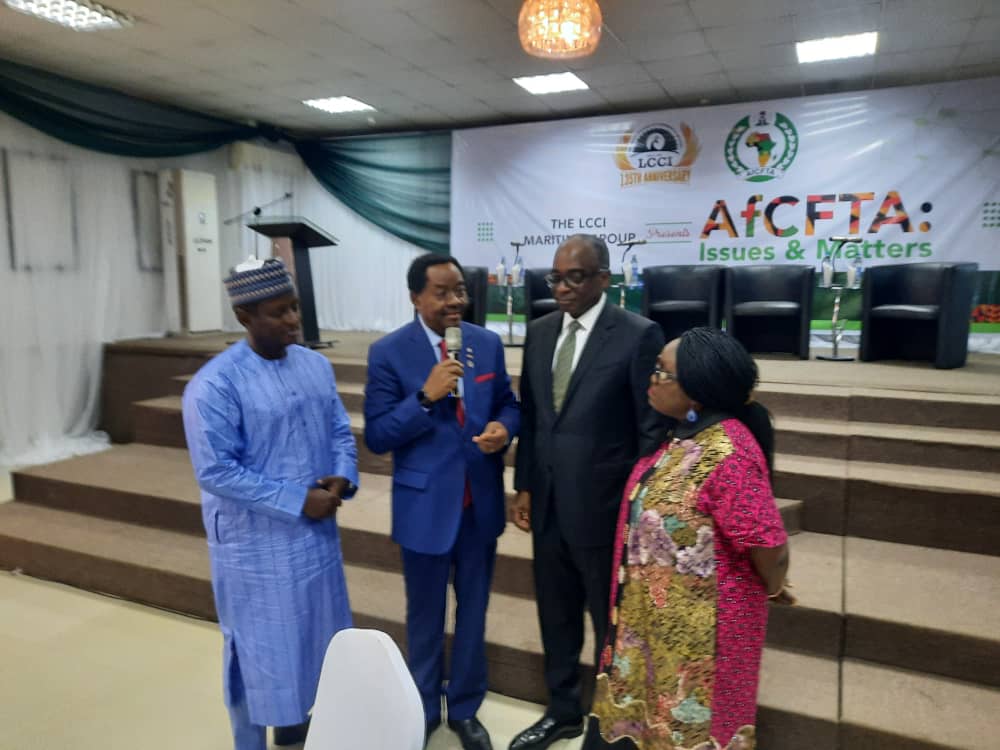The Lagos Chamber of Commerce and Industry (LCCI) has called for concrete and well spelt out action plan and strategy towards the implementation of the African Continental Free Trade Area (AfCFTA) agreement by Nigerian government.
At a Maritime Group symposium held at the Commerce House, Victoria Island on Tuesday, stakeholders in the country’s international trade chain observed that so much needed to be done to make Nigeria benefit from AfCFTA agreement.
These things begin from internal challenges access to the seaport by exporters to ownership of cargo vessels by Nigerians businessmen.
In his welcome speech at the symposium themed: “AfCFTA: Issues and Matters,” President of LCCI, Asiwaju Dr Michael Olawole-Cole said AfCFTA seeks to create the largest free trade geography in the world and increase intra-African trade by eliminating barriers to trade.
The AfCFTA agreement connects 1.3 billion people across 55 countries with a combined gross domestic product (GDP) valued in excess of $3.4 trillion. According to United Nations Conference on Trade and Development (UNCTAD), it has the potential to boost intra-Africa trade by about 33% and cut the continent’s trade deficit by 51%.
The LCCI boss stressed that achieving AfCFTA’s full potential will depend on putting in place significant policy reforms and trade facilitation measures.
He said, “The global maritime transport accounts for 80% of delivery in world trade, and Africa contributes about only 6.9% to global maritime trade. AfCFTA is therefore expected to meaningfully increase traffic flows on all transport modes particularly, maritime. It will also increase transport equipment needed significantly for all modes of transport.
“ The Economic Commission for Africa (ECA) estimates that, with the implementation of AfCFTA, 132 million tonnes of cargo will be transported by 2030. This would require about 126 vessels for bulk cargo and 15 vessels for container cargo. With these numerous opportunities, Nigeria must plan and leverage its strategic geographic location and abundant natural resources to optimise the potential of AfCFTA and position herself through policies, investment in infrastructure and equipment including ports and vessels to compete effectively in the transportation of enormous sea trade and commerce.”
While lauding the President Bola Tinubu administration for creating the Ministry of Marine Resources and Blue Economy, Olawole-Cole emphasised that there was a need to address the myriad of challenges in the maritime sector including regulatory gaps, maritime security, funding, high freight rates, poor turnaround time in cargo clearance, inadequate storage capacities, low fleet ownership, tariff and non-tariff barriers.
“Other challenges include skills gaps, absence of shipbuilding and recycling, and weak regulatory and legal frameworks in monitoring illegal activities in the sector.
“I therefore, wish to commend the administration of President Bola Ahmed Tinubu for the creation of the ministry of Marine and Blue Economy. This demonstrates government’s plan to optimally explore the opportunities in the marine sector and ensure its sustainable growth and development.
Other Stakeholders who spoke at the event highlighted various challenges against the implementation of AfCFTA and called on the government to collaborate with the private sector to address the problems.
The Executive Secretary, National Action Committee on AfCFTA, Mr Olusegun Awolowo, keynote speaker at the LCCI Maritime Group symposium, said it was paramount for Nigeria to address these challenges given the immense benefits inherent in the AfCFTA agreement.
He broke the areas of concern into four, which included infrastructural development, regulation, capacity building and automation of port processes.
He said: “Efficient maritime infrastructure is backbone of international trade and of course, AfCFTA. Port and terminal infrastructure have to be there and the government will need to streamline Customs procedures.
“Because Nigeria has been import-dependent, the operation of our ports is geared towrad importation. We also need to accept that the Customs is not a revenue agency. These days we read reports suggesting that the Customs is focusing on revenue generation but we are losing out on trade. Nigeria has to be an export economy.”
The event was attended by indigenous shipowners, seaport terminal operators, insurance brokers, bankers and customs brokers and freight forwarders, among other maritime industry players, as well as the Oniru of Iruland, His Royal Majesty, Oba Abdulwasiu Omogbolahan Lawal, Abisogun II.


